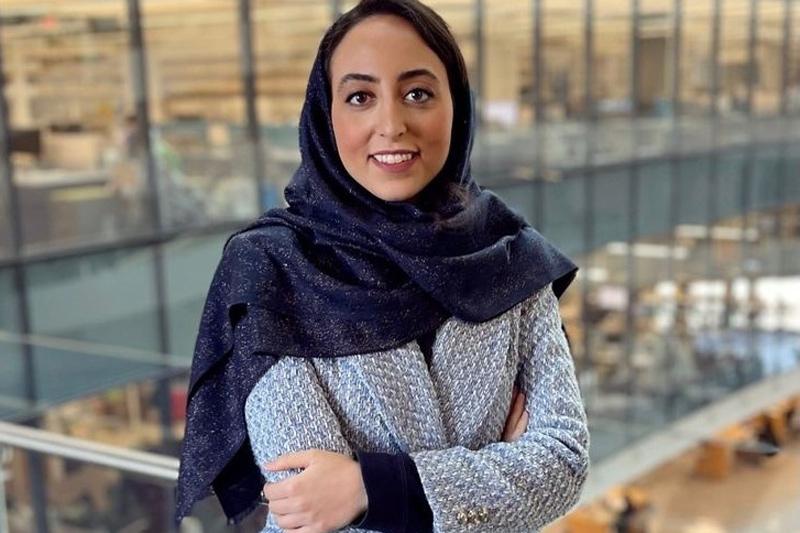How Tufts' Pharmacology and Drug Development Program Inspired an Alum to Pursue a PharmD

Helia Mojahed-Yazdi, a 2021 graduate of the MS in Pharmacology and Drug Development program at Tufts University Graduate School of Biomedical Sciences, combined her love of neuroscience and clinical research to pursue novel therapies for Parkinson’s disease. With a focus on hands-on learning, interdisciplinary collaboration, and scientific innovation, Helia’s time at Tufts prepared her for the next step in her professional journey. Learn more about her research, experiences, and advice for prospective students in the Q&A below.
Why did you choose to pursue this degree?
"I chose to pursue the Pharmacology and Drug Development program because it brings together science, medicine, and innovation—three areas I’m really passionate about. What drew me to this program is its unique mix of strong academic training in pharmacology, along with research and hands-on experience. I believe this combination will not only build a solid foundation of knowledge but also give me the practical skills I need to make a real impact in the pharmaceutical and biotech industries."
Why did you choose Tufts to pursue your degree?
"Tufts is well known for its strong research in medicine and science, and its location right next to Tufts Medical Center in Boston—a major hub for pharmaceutical and biotech companies—makes it an ideal place to learn and grow. The program is supported by experienced faculty from both the biomedical sciences and the hospital, offering a wide range of research opportunities. One of the things I really appreciate is the structure of the program: the first year includes research rotations, which give students time to explore different areas before choosing a focus for their second-year research. The environment is welcoming, and the department has a supportive and helpful team, making it a great place to study and develop professionally."
What is the focus of your research, and what questions are you trying to answer?
"My thesis focused on Noninvasive Intranasal GDNF Gene Therapy as a Novel Treatment Approach for Neurodegenerative and Other Dopamine-Associated Disorders. The main objective was to identify real-time changes in neurotransmitter kinetics in the dorsal striatum and other brain regions following this treatment, with the ultimate goal of confirming its neuroprotective effects."
What was experience like?
"I had a valuable two-year experience in the program. I worked in three different labs with experienced advisors, which helped me learn many practical and specialized techniques related to my research. I’ve always been interested in neuroscience, and this program gave me a chance to explore it further. My advisor was very supportive and guided me throughout, helping me feel well prepared for after graduation."
What was your favorite aspect about the program?
"The journal clubs, group work, lectures, and hands-on experiences, along with the first-year rotational lab research and final-year thesis, give you plenty of time to deepen your expertise while continuing to learn. The program is also supported by a wide range of faculty with diverse backgrounds, which adds great value to the overall experience. Additionally, joining the Graduate Student Council gave me the chance to connect with students from other programs and learn more about the broader Tufts graduate community."
What are some of your favorite ways to recharge outside of the lab or classroom?
"Boston is a wonderful city, easy to get around and full of things to explore, which made my time outside the program really enjoyable. I also enjoy spending quality time with family and friends, working out, and cooking different cuisines."
What is your proudest academic/professional accomplishment while at Tufts?
"One of my proudest accomplishments at Tufts was completing my thesis on a novel treatment for Parkinson’s disease—a noninvasive intranasal GDNF gene therapy—in a field I’m really passionate about. I’m proud to have contributed to this important clinical research through my work. Additionally, I had the opportunity to work in three different labs, where I learned many new and specialized lab techniques. This experience broadened my skills and gave me a strong foundation for my future career."
How has completion of the program helped you advance your professional goals?
"Completing the program helped me build a strong foundation in pharmacology and drug development through hands-on research and mentorship. It also deepened my interest in pharmaceutical sciences and the clinical side of the field, inspiring me to pursue a Doctor of Pharmacy degree. This will enable me to have a greater impact on the community and contribute more effectively to the pharmaceutical industry with strong scientific knowledge."
What do you want a prospective student to know about Tufts?
"Tufts has a strong community of supportive faculty and alumni. To make the most of your time here, it’s important to be proactive and take advantage of the many opportunities the school offers. It’s a great place to step out of your comfort zone, explore different paths, and build a meaningful network that can help shape your journey ahead."
Meet Helia's Advisor Helia worked under the mentorship of Emmanuel Pothos PhD, whose lab focuses on neuroscience, with an emphasis on synaptic neurotransmission in central monoamine systems, especially dopaminergic pathways. |
Related Links:
PDD Overview
Request Info
PDD Admissions
Department:
MS in Pharmacology & Drug Development